新概念英语课件第77课
合集下载
新概念二l77课件
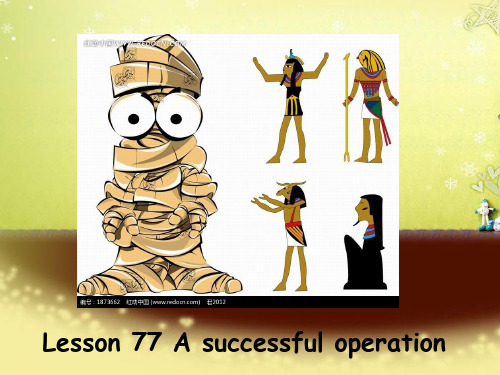
take plates of sth. 给……拍片子;take photos of sth.给…拍照片
find out + 从句
die 是瞬间动词,不能和段时间连用。要和段时间连用,就必须变成系表结构be dead。He has died for three years. ×
die of + 内因 死于…… die of hunger die from + 外因 死于…… die from wound
mummy
mark
temple
Egyptian
plate
figure
Egyptian temple mummy figure
section plate
mark
prove
disease last survive
skin resin
last
延续(常跟一个表示时间的名词或短语,没有被动语态) last直接加时间或加for+时间 The meeting lasts (for) three hours.
"not yet", 死因还是不明。
what 对名词提问,how对副词或介词短语提问。 how在这里是对of sth.提问的。要想用what提问,died后面加of。
9. They feared that the mummy would fall to pieces when they cut it open, but fortunately this has not happened.
3、As there were strange marks on the X-ray plates taken of the mummy, doctors have been trying to find out whether the woman died of a rare disease.
find out + 从句
die 是瞬间动词,不能和段时间连用。要和段时间连用,就必须变成系表结构be dead。He has died for three years. ×
die of + 内因 死于…… die of hunger die from + 外因 死于…… die from wound
mummy
mark
temple
Egyptian
plate
figure
Egyptian temple mummy figure
section plate
mark
prove
disease last survive
skin resin
last
延续(常跟一个表示时间的名词或短语,没有被动语态) last直接加时间或加for+时间 The meeting lasts (for) three hours.
"not yet", 死因还是不明。
what 对名词提问,how对副词或介词短语提问。 how在这里是对of sth.提问的。要想用what提问,died后面加of。
9. They feared that the mummy would fall to pieces when they cut it open, but fortunately this has not happened.
3、As there were strange marks on the X-ray plates taken of the mummy, doctors have been trying to find out whether the woman died of a rare disease.
新概念英语-第一册-Lesson+77课件

Can’t you wait till tomorrow?
eg. Didn't you know? 难道你不知道吗? Aren't you a student? 难道你不是学生吗?
回答: 否定疑问句的答语在形式上与一般疑问句的答语一样,肯定是Yes,否
定为No。但翻译成汉语时,Yes要翻译成“不” ,No要翻译成“对,是 的”。
The text
NURSE: Is it urgent? MR. CROFT: Yes, it is. It's very urgent. I feel awful.
I have a terrible toothache. NURSE: Can you come at 10 a.m. on Monday, April 24th? MR. CROFT: I must see the dentist now, nurse.
课堂练习
三、 用所给动词的适当形式填空(10分) 1. Mr. Croft wants ___________ (see) the doctor. 2. It is urgent for me ___________ (have) an appointment with him. 3. They are not going back to work until they ___________ (get) a lot of money. 4. The students are busy ___________ (listen) to the teacher. 5. The cat ___________ (jump) off the wall a minute ago. 6. My sister ___________ (buy) this pair last month. 7. He ___________ (speak) German. He was a tourist. 8. ___________ women always ___________ (wear) uncomfortable shoes? 9. The shoes like those ___________ (be) in fashion last year and the year before last. 10. He ___________ (go) to a town near the sea a short time ago.
eg. Didn't you know? 难道你不知道吗? Aren't you a student? 难道你不是学生吗?
回答: 否定疑问句的答语在形式上与一般疑问句的答语一样,肯定是Yes,否
定为No。但翻译成汉语时,Yes要翻译成“不” ,No要翻译成“对,是 的”。
The text
NURSE: Is it urgent? MR. CROFT: Yes, it is. It's very urgent. I feel awful.
I have a terrible toothache. NURSE: Can you come at 10 a.m. on Monday, April 24th? MR. CROFT: I must see the dentist now, nurse.
课堂练习
三、 用所给动词的适当形式填空(10分) 1. Mr. Croft wants ___________ (see) the doctor. 2. It is urgent for me ___________ (have) an appointment with him. 3. They are not going back to work until they ___________ (get) a lot of money. 4. The students are busy ___________ (listen) to the teacher. 5. The cat ___________ (jump) off the wall a minute ago. 6. My sister ___________ (buy) this pair last month. 7. He ___________ (speak) German. He was a tourist. 8. ___________ women always ___________ (wear) uncomfortable shoes? 9. The shoes like those ___________ (be) in fashion last year and the year before last. 10. He ___________ (go) to a town near the sea a short time ago.
最新新概念二册77课PPT课件
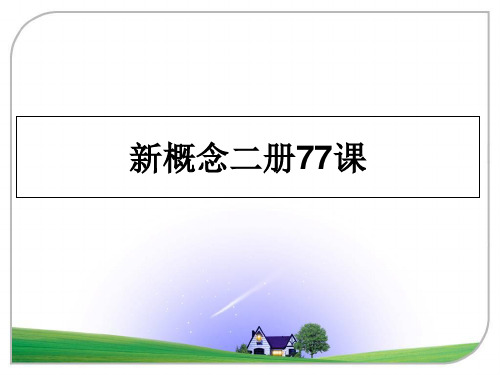
效果,所以在理论剂量计算出后还要根据甲 状腺的质地,有无结节,有无服用内科抗甲 亢药物等因素加减剂量。
• 4、给药方法: • 为保证药物的吸收,应空腹口服131I,服
药后2小时方可进食。 • 5、重复治疗:治疗后3~6个月后确定未痊愈
的病人可二次治疗。
(五)治疗反应及处理
• 一、早期反应:少数病人在服用131I几天后出现乏 力、头晕、食欲下降、恶心、呕吐、皮肤瘙痒、 甲状腺局部肿痛等反映,一般不需特殊处理。极 少数病人发生甲亢危象,对这一问题主要采取预 防为主,主要措施有:
• prove v. 显示出
• resin n. 树脂
• skin n. 皮肤
• section
n. 切片
• figure n. (人的)体形;人像
• normally adv. 通常地
• survive
v. 幸免于
• last vi. 持续,延续(常跟一个表示时间
的名词或短语,没有被动语态)
• 1、严重病人治疗前后均可使用抗甲亢药物控制 • 2、嘱病人注意休息,防止感染,避免劳累和精神
刺激 • 3、加强随访如有迹象立即入院处理。
二、甲状腺功能低下的发生:分为早发甲低、 晚发甲低。
早发甲低:发生在治疗后一年内的甲状 腺功能减低。早发甲低于剂量相关。
晚发甲低:发生在治疗后一年以上(每 年越增加2%-3%)的甲状腺功能减低。与剂 量无关。
• 4、As there were strange marks on the X-
ray plates taken of the mummy, doctors have been trying to find out whether the woman died of a rare disease.
• 4、给药方法: • 为保证药物的吸收,应空腹口服131I,服
药后2小时方可进食。 • 5、重复治疗:治疗后3~6个月后确定未痊愈
的病人可二次治疗。
(五)治疗反应及处理
• 一、早期反应:少数病人在服用131I几天后出现乏 力、头晕、食欲下降、恶心、呕吐、皮肤瘙痒、 甲状腺局部肿痛等反映,一般不需特殊处理。极 少数病人发生甲亢危象,对这一问题主要采取预 防为主,主要措施有:
• prove v. 显示出
• resin n. 树脂
• skin n. 皮肤
• section
n. 切片
• figure n. (人的)体形;人像
• normally adv. 通常地
• survive
v. 幸免于
• last vi. 持续,延续(常跟一个表示时间
的名词或短语,没有被动语态)
• 1、严重病人治疗前后均可使用抗甲亢药物控制 • 2、嘱病人注意休息,防止感染,避免劳累和精神
刺激 • 3、加强随访如有迹象立即入院处理。
二、甲状腺功能低下的发生:分为早发甲低、 晚发甲低。
早发甲低:发生在治疗后一年内的甲状 腺功能减低。早发甲低于剂量相关。
晚发甲低:发生在治疗后一年以上(每 年越增加2%-3%)的甲状腺功能减低。与剂 量无关。
• 4、As there were strange marks on the X-
ray plates taken of the mummy, doctors have been trying to find out whether the woman died of a rare disease.
新概念英语NCE2_Lesson77(共24页)课件

I will prove it to you.
首先你应该证明你是在这买的东西。
You should first prove that you bought these goods here.
Section
1)切片 医生在显微镜下仔细检查从尸体上切下来的切片。
The doctor examined the section cut from the dead body under the microscope.
He is the last man in the world I want to see.
Prove
① vi. 显示,表明
prove +to be +adj.
结果证实他是那本书的作者
He proved to be the author of the book.
② vt. 证明,证实 我将会证明给你看
我很想知道他们ow they can survive on such poor income.
survival n. 幸存 survivor n. 幸存者 victim n.死难者,受害者
The mummy of an Egyptian woman who died in 800 B.C. has just had an operation.
1)vi. 持续,延续 常跟一个表示时间的名词或短语,没有被动语态
会议进行了3个小时
The meeting lasts three hours.
两国的战争一直持续到1453年。
The war between the two countries lasted until 1453.
2) 最不可能…的,最不…的 (most unlikely) 他是我最不想见的人
首先你应该证明你是在这买的东西。
You should first prove that you bought these goods here.
Section
1)切片 医生在显微镜下仔细检查从尸体上切下来的切片。
The doctor examined the section cut from the dead body under the microscope.
He is the last man in the world I want to see.
Prove
① vi. 显示,表明
prove +to be +adj.
结果证实他是那本书的作者
He proved to be the author of the book.
② vt. 证明,证实 我将会证明给你看
我很想知道他们ow they can survive on such poor income.
survival n. 幸存 survivor n. 幸存者 victim n.死难者,受害者
The mummy of an Egyptian woman who died in 800 B.C. has just had an operation.
1)vi. 持续,延续 常跟一个表示时间的名词或短语,没有被动语态
会议进行了3个小时
The meeting lasts three hours.
两国的战争一直持续到1453年。
The war between the two countries lasted until 1453.
2) 最不可能…的,最不…的 (most unlikely) 他是我最不想见的人
新概念英语第一册Lesson77-78课件
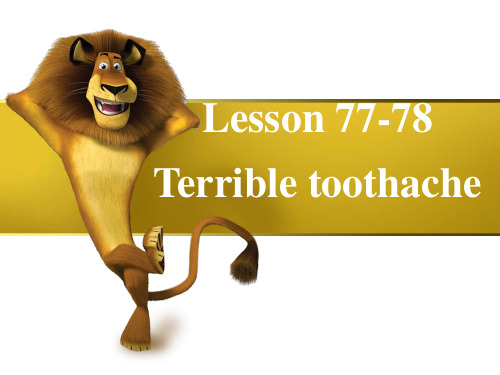
模仿例句回答以下问题,注意时间状语的变化 eg: It’s eight o’clock. When did you see him?
(half an hour ago) I saw him at half past seven. It’s Friday. When did she go to London? (the day before yesterday) She went to London on Wednesday. It’s June. When did Mr Jones buy that car? (last month) He bought that car in May.
Can 't you come at 2 a.m.?
Are n't you a boy?
Did n't you do your homework?
步
先变
be/助/情
骤
一般疑问句
后加not
1. I can play football. Can you play football?
Can't you play football?
She went to town yesterday. 1. She buys a new car every day.
She _b_o_u_g_h_t a new car last year. 2. She airs the room every day.
She _a_i_re_d__ it this morning.
NURSE: Do you _h__a_v_e_a__n__a_p_p_o_i_n_t_m__e_n_t__? MR. CROFT: No, I don’t. 有一个预约
新概念英语第一册 Lesson 77 Terrible toothache 课件

must和have to的用法
1. 表示必须、必要。(must表示主观多一些而have to则表示客观多一 些)如:
I have to give up smoking.(可能是由于身体或其它原因等不得不戒 烟)
I must give up smoking. (自己觉得有必要戒烟) You must come in time. 你必须及时过来。 回答must引出的问句时,如果是否定的回答,不能用mustn't,而 要用needn't或don't have to。 — Must we hand in our exercise books today? — Yes,you must. (No,you don’t have to.) —我们今天必须交上练习册吗? —是的。(不,不必。)
情态动词
1- 具有助动词作用,可以用来构成否定句,疑问句及用于简单回答。 Can you sing an English song? 你会唱英语歌吗? Yes, I can。 是的,我会。 2-除ought和used以外,其他情态动词后面只能接不带to的不定式。如果我们把ought to和used to看做是固定词组的话,那么,所有情态动词无一例外地只能接不带to的不定 式 She may lose her way. 她可能迷路了。 3-无人称和数的变化。 We must stay here. 我们必须待在这儿。 4-有一定的词义,但并不完整,必须与动词原形一起构成谓语。 5.在以Could引导的表示委婉语气的疑问句,常用来表示请求别人的帮助。注意的是这里 不是情态动词的用法。 回答为:肯定:Yes,I can./Sure./Certainly. 否定:Sorry,I am afraid not. 在作否定回答时,要注意:在拒绝别人的请求时,不能用can not,这样显得语气太过生 硬。但是在长辈拒绝晚辈的请求是可以用can not的。
2024年新概念英语NCE2_Lesson77(共19页)课件
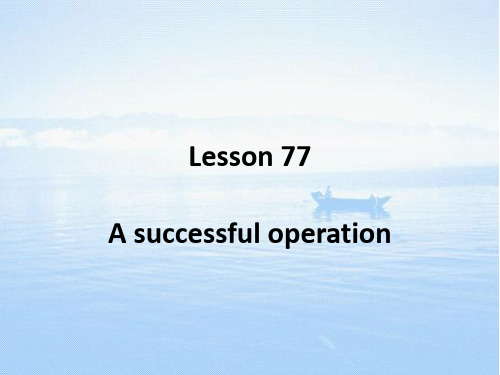
• The horse has a white mark on its head • 2)n. 分数 • 我在拼写考试中得了满分
• I got full marks in the spelling test. • 3)n. 标记 • 他用铅笔做标记
• He made marks with a pencil. • 3)v. 标记 • 商品木乃伊 • adj. 埃及的 • n. 庙 • n. 斑点 • n. (照相)底片 • n. 疾病 • v. 持续 • v. 显示出 • n. 树脂 • n. 皮肤 • n. 切片 • n. (人的)体形;人像 • adv. 通常地 • v. 幸免于
• mark • 1)n. 斑点 • 这匹马头上有一个白色斑点
bedroom. • 当她看到卧室的房间里有个黑影时尖叫了起来。
• normally adv. 通常地,正常地 • 通常他的坏心情会持续一到俩天。 • Normally his bad mood will last one or two days. • 通常在早上路上的车会少些。 • There are less cars in the morning.
• survive v.幸免于,存活 • 没有乘客在空难中幸存。
• None of the passengers survived in the air crash.
• 我很想知道他们靠那么可怜的收入是怎么活下 来的。
• I wonder how they can survive on such poor income.
goods here.
• Section • 1)切片 • 医生在显微镜下仔细检查从尸体上切下来的切
片。
• The doctor examined the section cut from the dead body under the microscope.
• I got full marks in the spelling test. • 3)n. 标记 • 他用铅笔做标记
• He made marks with a pencil. • 3)v. 标记 • 商品木乃伊 • adj. 埃及的 • n. 庙 • n. 斑点 • n. (照相)底片 • n. 疾病 • v. 持续 • v. 显示出 • n. 树脂 • n. 皮肤 • n. 切片 • n. (人的)体形;人像 • adv. 通常地 • v. 幸免于
• mark • 1)n. 斑点 • 这匹马头上有一个白色斑点
bedroom. • 当她看到卧室的房间里有个黑影时尖叫了起来。
• normally adv. 通常地,正常地 • 通常他的坏心情会持续一到俩天。 • Normally his bad mood will last one or two days. • 通常在早上路上的车会少些。 • There are less cars in the morning.
• survive v.幸免于,存活 • 没有乘客在空难中幸存。
• None of the passengers survived in the air crash.
• 我很想知道他们靠那么可怜的收入是怎么活下 来的。
• I wonder how they can survive on such poor income.
goods here.
• Section • 1)切片 • 医生在显微镜下仔细检查从尸体上切下来的切
片。
• The doctor examined the section cut from the dead body under the microscope.
新概念英语第一册Lesson77(共70张PPT)-文档资料
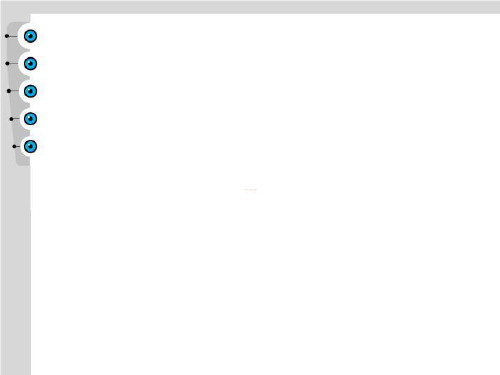
Why does he want to see the dentist?
Because he has terrible toothache.
How urgent is it?
It’s very urgent.
Can the dentist see him now?
No, he can’t.
Why can’t the dentist see him now?
a man who has toothache.
What time of day is it, do you think?
How do you know?
It’s morning. The nurse says, ‘Can’t you wait till this afternoon?’
Good morning, Mr. Croft.
Because he’s very busy at the moment.
What time can the dentist see him today?
At 2 p.m.
ห้องสมุดไป่ตู้
Can’t Mr. Croft wait till this afternoon?
Yes, he can, but his toothache can’t.
• Nurse:The dentist is very busy at the
moment. Can you come at 2 p.m.?
That’s very late.
Can the dentist see me now?
I’m afraid that he can’t, Mr. Croft.
•
当主句是一般现在时,从句可以用任何时态
新概念英语第一册第77-78课课件

have a bath
• Is it urgent? • Yes, it is. It is very urgent. I feel awful. I have a terrible toothache.
have a headache have a fever
I feel happy. He feels illadj. 紧迫的;急迫的 ② adj. 催促的;坚持要求的 an urgent telephone call • an urgent meeting Eg: The cries and shouts became louder and more urgent.
• (do:) Don’t you want to stay with us?
• • • • • • • • • • • 你难道不愿意与我们呆在一起吗? (did:) Didn’t you see him yesterday? 难道你昨天没看见他吗? 回答这种问题时用简略回答。如果答语是肯定的,就用 Yes; 如果答语是否定的,就用No。 一般否定疑问句有完全式和简略式之分,它们的词序是不同的。 完全式: Is she not a nurse? 她不是一位护士吗? 简略式: Isn’t she a nurse? 她不是一位护士吗?
Sum up:
1、Have • have a good time / a bath / a cake / a drink • have some money / some envelopes • have a headache / a fever / flu / an earache
• Can you come at 10 a.m. on Monday April 24th? • I must see the dentist now, nurse. • The dentist is very busy at the moment. Can you come at 2 p.m.?
• Is it urgent? • Yes, it is. It is very urgent. I feel awful. I have a terrible toothache.
have a headache have a fever
I feel happy. He feels illadj. 紧迫的;急迫的 ② adj. 催促的;坚持要求的 an urgent telephone call • an urgent meeting Eg: The cries and shouts became louder and more urgent.
• (do:) Don’t you want to stay with us?
• • • • • • • • • • • 你难道不愿意与我们呆在一起吗? (did:) Didn’t you see him yesterday? 难道你昨天没看见他吗? 回答这种问题时用简略回答。如果答语是肯定的,就用 Yes; 如果答语是否定的,就用No。 一般否定疑问句有完全式和简略式之分,它们的词序是不同的。 完全式: Is she not a nurse? 她不是一位护士吗? 简略式: Isn’t she a nurse? 她不是一位护士吗?
Sum up:
1、Have • have a good time / a bath / a cake / a drink • have some money / some envelopes • have a headache / a fever / flu / an earache
• Can you come at 10 a.m. on Monday April 24th? • I must see the dentist now, nurse. • The dentist is very busy at the moment. Can you come at 2 p.m.?
新概念英语第二册Lesson 77课件

• figure
• • • • • • • • • •
1)n.(女人的)体形 do exercises to improve one`s figure 做运动以改进身材 2)人像;人影 eg:She screamed when she saw a dark figure in her bedroom. 当她看到卧室的房间里有个黑影时尖叫了起来。 eg:A group of figures on the left of the picture. 在照片左边的一群人。 3)要人,名士(相当于VIP) eg:He was both a political and a religious figure in Indian history. 他是印度历史上政界和宗教界的要人。 4)数字
2018/9/2
•
•
•
•
•
New words
• • • • • • • • • • • • • • mummy Egyptian temple mark plate disease last prove resin skin section figure normally survive n. 木乃伊 adj. 埃及的 n. 庙 n. 斑点 n. (照相)底片 n. 疾病 v. 持续 v. 显示出 n. 树脂 n. 皮肤 n. 切片 n. (人的)体形;人像 adv. 通常地 v. 幸免于
• Section
• • • • • • • • • • • •
(a very thin flat piece cut from skin, plant growth,,ect, t o be looked at under a microscope) 1)切片 eg:The doctor examined the section cut from the dead body under the microscope. 医生在显微镜下仔细检查从尸体上切下来的切片。 2)部分 eg:The back section of the plane caught fire. 飞机的尾部着火了。 3)区域,部门,阶层,段落,章节 the business section of a city 城市的商业区 all sections of a country全国各界 all sections of the population全国各阶层 the section of an office dealing with record-keeping 负责档案管理的部门s ports section体育版面
新概念英语第一册Lesson-77课件

Lesson 77 Terrible toothache
What’s the matter with him/ her? He/ she has a/an... What must he/ she do? He/ She must...
New words
• appointment [əˈpɔɪntmənt] • urgent [ˈəːdʒənt] • till [tɪl]
Can you come at 2 p.m.?
MR. CROFT: That's very la9te. Can the dentist see me now?
NURSE:
I'm afraid that he can't, Mr. Croft.
Ca1n0't you wait till this afternoon?
பைடு நூலகம்
n. 约会,预约 adj. 紧急的,急迫的 prep. 直至…为止
Watch and answer : ●What time of day is it, do you think? How do you know?
Listen and fill in the
blanks
NURSE:
Good morning. Mr. Croft.
I have a terrible toothache.
NURSE:
Can you come at 150 a.m. on Mon6day, Apri7l 24th?
MR. CROFT: I must see the dentist now, nurse.
NURSE:
The dentist is very busy at the 8moment.
What’s the matter with him/ her? He/ she has a/an... What must he/ she do? He/ She must...
New words
• appointment [əˈpɔɪntmənt] • urgent [ˈəːdʒənt] • till [tɪl]
Can you come at 2 p.m.?
MR. CROFT: That's very la9te. Can the dentist see me now?
NURSE:
I'm afraid that he can't, Mr. Croft.
Ca1n0't you wait till this afternoon?
பைடு நூலகம்
n. 约会,预约 adj. 紧急的,急迫的 prep. 直至…为止
Watch and answer : ●What time of day is it, do you think? How do you know?
Listen and fill in the
blanks
NURSE:
Good morning. Mr. Croft.
I have a terrible toothache.
NURSE:
Can you come at 150 a.m. on Mon6day, Apri7l 24th?
MR. CROFT: I must see the dentist now, nurse.
NURSE:
The dentist is very busy at the 8moment.
新概念英语第二册Lesson 77 (共79张PPT)

T: What do you think is happening in the picture?
Listening objective
T : Did the doctors find out how the woman died? Answer: No, they didn't.
Comprehension questions
Text the Temple of Thebes
Text
As there were strange marks on the X-ray plates taken of the mummy, doctors have been trying to find out whether the woman died of a rare disease.
Lesson 77 A successful operation
Introduce the story
T: Today we’ll listen to a story about an operation on an Egyptian mummy.
Understand the situation
die of … 因(患)……而死
Text
The only way to do this was to operate.
Text
The operation, which lasted for over four hours, proved to be very difficult because of the hard resin which covered the skin.
disease n.
diseases of society 社会弊端
Listening objective
T : Did the doctors find out how the woman died? Answer: No, they didn't.
Comprehension questions
Text the Temple of Thebes
Text
As there were strange marks on the X-ray plates taken of the mummy, doctors have been trying to find out whether the woman died of a rare disease.
Lesson 77 A successful operation
Introduce the story
T: Today we’ll listen to a story about an operation on an Egyptian mummy.
Understand the situation
die of … 因(患)……而死
Text
The only way to do this was to operate.
Text
The operation, which lasted for over four hours, proved to be very difficult because of the hard resin which covered the skin.
disease n.
diseases of society 社会弊端
新概念二77_课件

The mummy of an Egyptian woman (1) died in 800 B.C. has just had an operation. The mummy is (2) of Shepenmut (3) was once a singer in the Temple of Thebes. (4) there were strange marks on the X-ray plates (5 take) of the mummy, doctors have been trying (6) find out whether the woman died of a rare disease (7) the only way to do this was (8) operate. The operation, (9) lasted for over four hours, proved to be very difficult (10) (11)the hard resin (12) covered the skin. The doctors removed a section of the mummy (13) sent it to a laboratory. They also found something (14) the X-ray plates did not show: a small wax figure of the god Duamutef. This god (15) has the head of a cow was normally placed inside a mummy. The doctors have not (16) decided how the woman died. They feared that the mummy would fall to piece (17) they cut it open, (18) fortunately this has not happened. The mummy successfully survived the operation.
新概念第77课课件

burn down(使)烧毁
虚拟语气: 一.语气的定义和种类。 1 语气(mood) 语气是动词的一种形式,表示说话人对某一行为或事情的看法和态度。 2 语气的种类 a. 陈述语气:表示动作或状态是现实的、确定的或符合事实的,用于陈述句、 疑问句和某些感叹句。如: There are two sides to every question.每个问题都有两个方面。 Were you busy all day yesterday?昨天一整天你都很忙吗? How good a teacher she is!她是多好的一位老师啊! b. 祈使语气:表示说话人对对方的请求或命令。如: Never be late again!再也不要迟到了。 Don’t forget to turn off the light.别忘了关灯。 c. 虚拟语气:表示动作或状态不是客观存在的事实,而是说话人的主观愿望、 假设或推测等。如: If I were a bird, I could fly in the air.如果我是一只小鸟,我就能在空中飞行。 I wish I could pass the examination.我希望我能通过考试。 May you succeed!祝您成功!
word生词 parliament n. 议会,国会 erect v. 建起 accurate adj. 准确 official n. 官员,行政人员 Greenwich n. 格林尼治 observatory n. 天文台 check v. 检查 microphone n. 扩音器,麦克风 tower n. 塔
二.虚拟语气在条件从句中的用法。 条件从句有两类,一是真实条件句,另一是虚拟条件句。如果假设的情况可能发生, 是真实条件句,这种情况下谓语用陈述语气。if有表示“如果”的意思如: If time permits, we’ll go fishing together.如果时间允许,我们就一起去钓鱼。 如果假设的情况是不存在的或不大可能发生的,则是虚拟条件句。虚拟条件句就是对 现实条件的一种虚拟假设,所假设的条件一般不符合事实或与事实相反或在现实中发 生的可能性极小。根据时间的不同,虚拟条件句可分为三种,即与现在事实相反的虚 拟条件句、与过去事实相反的虚拟条件句及与将来事实相反的虚拟条件句。 如: If you had come yesterday, you would have met that famous professor.如果你昨天来, 你就会见到那位著名的教授了。(隐含的事实是:你昨天没来,也没见到那位著名教 授)。 在含有虚拟条件句的复合句中,主从句的谓语都要用虚拟语气,现将其形式列表如下: 动词形式 时间从句主句 与现在事实相反动词过去式从句用(be的过去式用were)+ 主句would (could/should/might)+动词原形 与过去事实相反从句用had+动词过去分词 主句用would (could/should/might) +have过去分词 与将来事实可能相反动词过去式 从句用should+动词原形, 主句用would (could/should/might)+动词原形 或者were to+动词原形would (could/should/might)+动词原形
虚拟语气: 一.语气的定义和种类。 1 语气(mood) 语气是动词的一种形式,表示说话人对某一行为或事情的看法和态度。 2 语气的种类 a. 陈述语气:表示动作或状态是现实的、确定的或符合事实的,用于陈述句、 疑问句和某些感叹句。如: There are two sides to every question.每个问题都有两个方面。 Were you busy all day yesterday?昨天一整天你都很忙吗? How good a teacher she is!她是多好的一位老师啊! b. 祈使语气:表示说话人对对方的请求或命令。如: Never be late again!再也不要迟到了。 Don’t forget to turn off the light.别忘了关灯。 c. 虚拟语气:表示动作或状态不是客观存在的事实,而是说话人的主观愿望、 假设或推测等。如: If I were a bird, I could fly in the air.如果我是一只小鸟,我就能在空中飞行。 I wish I could pass the examination.我希望我能通过考试。 May you succeed!祝您成功!
word生词 parliament n. 议会,国会 erect v. 建起 accurate adj. 准确 official n. 官员,行政人员 Greenwich n. 格林尼治 observatory n. 天文台 check v. 检查 microphone n. 扩音器,麦克风 tower n. 塔
二.虚拟语气在条件从句中的用法。 条件从句有两类,一是真实条件句,另一是虚拟条件句。如果假设的情况可能发生, 是真实条件句,这种情况下谓语用陈述语气。if有表示“如果”的意思如: If time permits, we’ll go fishing together.如果时间允许,我们就一起去钓鱼。 如果假设的情况是不存在的或不大可能发生的,则是虚拟条件句。虚拟条件句就是对 现实条件的一种虚拟假设,所假设的条件一般不符合事实或与事实相反或在现实中发 生的可能性极小。根据时间的不同,虚拟条件句可分为三种,即与现在事实相反的虚 拟条件句、与过去事实相反的虚拟条件句及与将来事实相反的虚拟条件句。 如: If you had come yesterday, you would have met that famous professor.如果你昨天来, 你就会见到那位著名的教授了。(隐含的事实是:你昨天没来,也没见到那位著名教 授)。 在含有虚拟条件句的复合句中,主从句的谓语都要用虚拟语气,现将其形式列表如下: 动词形式 时间从句主句 与现在事实相反动词过去式从句用(be的过去式用were)+ 主句would (could/should/might)+动词原形 与过去事实相反从句用had+动词过去分词 主句用would (could/should/might) +have过去分词 与将来事实可能相反动词过去式 从句用should+动词原形, 主句用would (could/should/might)+动词原形 或者were to+动词原形would (could/should/might)+动词原形
- 1、下载文档前请自行甄别文档内容的完整性,平台不提供额外的编辑、内容补充、找答案等附加服务。
- 2、"仅部分预览"的文档,不可在线预览部分如存在完整性等问题,可反馈申请退款(可完整预览的文档不适用该条件!)。
- 3、如文档侵犯您的权益,请联系客服反馈,我们会尽快为您处理(人工客服工作时间:9:00-18:30)。
语言点
• I have a terrible toothache. 我得了严重的牙疼。
• terrible a. 很差的,糟糕的
例句:这是部糟糕的电影。 This is a terrible film.
语言点
• April 24th 4月24号 读作:April the 24th
• 序数词复习: first second third 第一 第二 第三
文化背景:
西方国家一般看病都不是去大医院,而去私 人医院,医生很忙需要接待很多病人,只能安 排好时间,按预约时刻去看病,其他时间一般 没办法看病。
词汇
• Urgent a. 紧急的,急迫的
搭配:紧急会议 urgent meeting
例句:我们有一件紧要的事情。 We have an urgent thing.
新概念英语一册 Lesson 77
Terrible toothache 牙疼不是病,一疼要人命
词汇
• appointment n. 预约 区别: date n. 约会
-ment n. 名词后缀 以ment结尾的词通常是名词。
语言点
• Do you have an appointment? 你有预约么?
• 7.I have a terrible toothache. • 变成一般疑问句 • Do you have a terrible toothache? • 8.I must see the dentist now, nurse. • 变成否定句 • I mustn’t /needn`t see the dentist now, nurse. • 8.The dentist is very busy at the moment. • 对红色部分提问 • Who is very busy at the moment? • 9.Can the dentist see me now?变成肯定句 • The dentist can see you now.
语言点
• 第四: fourth 第十三:thirteenth
• 第五: fifth
第十四:fourteenth
• 第六: sixth
第十五:fifteenth
• 第七: seventh 第十六: sixteenth
• 第八: eighth 第十七: seventeenth
• 第九: ninth
第十八: eighteenth
• 单词3+1+1 • 课文会背 • 课课练完成 • 录音听一跟二 • 预习79,80
作业
• Good morning, Mr. Croft. • Good morning, nurse. I want to see the dentist (看牙
医), se. • Do you have an appointment (预约) ?
• No, I don't. • Is it urgent (急诊吗)? • Yes, it is. It's very urgent. I feel awful. (难受极了)
• 第十: tenth
第十九: nineteenth
• 第十一: eleventh 第二十: twentieth
• 第十二:twelfth
语言点
• 第二十一: twenty-first • 第三十二: thirty- second • 第四十三: forty- third 十位数基数词
个位数序数词
• Written exercises 书面练习 • 把下列句子改写成过去时。 • Example: • She goes to town every day. She went to
town yesterday. • 1 She buys a new car every year. She _b_o_u_g_h_t
• 第五十四: fifty - fourth • 第六十五: sixty – fifth • 第七十六: seventy - sixth • 第八十七: eighty - seventh • 第九十八: ninety-eight
语言点
• I’m afraid that he can’t, Mr. Croft.
恐怕他办不到呀,Croft 先生。
• I’m afraid that+句子(宾语从句)
表示否定,不是真的害怕, 而是语气婉转。
宾语从句跟在两类词后: 1. 表示人的情感或心理活动的形容词
afraid/ sure/ sorry/ glad/ anxious/ confident/ proud
• 主语+ be+ 形容词 + 宾语从句 • 主句和宾语从句中有that连接,后边加句子。
• till prep. 直到……为止
语言点
• Is it urgent? 很急么?
常用于医院,买票,排队等情况。
• I feel awful. 我觉得很糟糕。
感官动词 + 形容词
feel
awful
语言点
• I have a terrible toothache. 我得了严重的牙疼。
Have:小强动词 可以表示很多“动词含义” 在本句当作“得病”讲
• 我担心我明天去不了了。 I am afraid that I can't come tomorrow.
• 很抱歉我昨天没有去。 I am sorry that I didn't go yesterday.
• 我跟高兴你能帮助他们。 I am glad that you can help them.
• I can wait, but my toothache can't!
• 1.I want to see the dentist , please. • 对红色部分提问 • What do you want to do?
• 2.Do you have an appointment? • 变成肯定句 • I have an appointment. • 3.Is it urgent ?变成肯定句 • It is urgent. • 4.It‘s very urgent. 变成一般疑问句 • Is it very urgent? • 5.I feel awful.对红色部分提问 • How do you feel?
a new car last year. • 2 She airs the room every day. She __a_ir_e_d_ it
this morning. • 3 He often loses his pen. He __lo__st__ his pen
this morning.
•
• I have a terrible toothache.
• Can you come at 10 a.m. on Monday (on/in), April 24th?
• I must see the dentist now, nurse. • The dentist is (be适当形式) very busy at the moment.
• Can you come at 2 p.m.? (at/in/on) • That's very late. Can the dentist see me (I适当形式)
now?
• I'm afraid that he can't, Mr. Croft.
• Can't you wait till this afternoon?
2、主语+ 动词 +that +从句 其中的动词为: think/ know/ believe/ say/ hope/ understand
• 她知道你会来的。 She knows that you will come.
• 我相信我能飞。 I believe (that) I can do the work.
